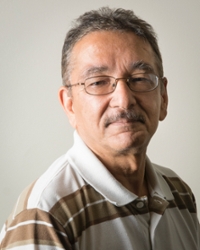Alok Bohara
Bio
Inspiration
- “[In scientific research,] march away from the sound of the guns. Observe from a distance, but do not join the fray. Make a fray of your own. .. In the attempt to make scientific discoveries, every problem is an opportunity — and the more difficult the problem, the greater will be the importance of its solution.” -- Professor E.O. Wilson, celebrated biologist, Harvard University https://www.ted.com/talks/e_o_wilson_advice_to_young_scientists?language=en
- “Nobody ever figures out what life is all about, and it doesn't matter. Explore the world. Nearly everything is really interesting if you go into it deeply enough.” ― Richard Feynman, Physics Nobel Laureate
- "Stay foolish, stay hungry." -- Steve Jobs, a techno visionary
- "..it's a question of taking an adequately broad view of economics, along with its neighboring discipline, and it's also a question of paying more attention to those who are most likely to lose when a crisis hits." Amartya Sen on this century’s challenges (1998 Nobel Prize Winner in Economics)
Challenges to Graduate and Undergraduate Students
Developing Interdisciplinary Community-Engaged Research
Example 1: Interdisciplinary approaches to rebuilding resilient communities
Example 2: Women's empowerment and impact of female hygiene kits
Example 3: Urban ecology, human health, and sustainability through citizen science
Got any other ideas?
Sustainable Development Action Lab
Need-driven Research, Research-driven Solution: design, implementation, and evaluation
Nepal Study Center, May 12, 2016
Ongoing Research Interests and Activities
Coupled Dynamic of Human and Natural Systems: (Analysis of urban social ecological systems: health, sanitation, economic activities and urban ecology & eco-system services; solid waste management and recycling; air pollution and traffic congestion)
WASH and gender (water, sanitation, and health; female hygiene and its socio-economic consequences --sanitary pads; ground water arsenic and its impact on women's health; cultural norms and health consequences --bathing in Bagmati)
Mortality and air pollution (panel and time series analysis using splines and Markov Switching; Mexico City)
Gender empowerment and maternal and child welbeing (micro finance, micro health, domestic violence and health consequences)
Socio-economic consequences of cancer (Kathmandu Valley and Bharatpur Hospitals; American Cancer Society funded project)
Monitoring of air, water, and bio-diversity through citizen science and its impact on human health, behavior, awareness , and urban ecology
Climate change, sustainability, food security and coping strategies (micro crop and cattle insurance; technological adaptation; shed coffee) http://pnfoundation.org.np/our-projects/bio-park-and-learning-center/
Natural disasters, its impact and building resilient communities (e.g., earthquake, http://unm4nepal.weebly.com/get-involved.html)
Obesity, empty calorie and programmatic interventions (e.g., SNAP)
Socio-economic consequences of remittance economy
Multi-dimentional poverty indicator (MPI)
For past research on food security, maternal health, poverty, global warming, water quality, non-market valuation studies, see http://nepalstudycenter.unm.edu/ResearchCapacity.htm
Methodological Bends
Teaching Interests
- Econometrics
- Development Analytics
- Time Series Analysis
- Mathematical Statistics
- Non-market Valuation Methodology
- Forecasting
- Quantitative Methods
- Research Methodology
Selected Publications
- Price, James I. and Alok K. Bohara, “Maternal Healthcare Amid Political Unrest: The Effects of Political Violence on Antenatal Care Utilization in Nepal,” Journal of Health Policy and Planning, 2012, pp. 1-11 (Accepted 2012)
- Nepal, Mani, Alok K. Bohara, and Kishore Gawande, “More Inequality, More Killings: The Maoist Insurgency in Nepal,” The American Journal of Political Science, Vol. 55, No. 4, October 2011, pp. 886 – 903.
- Milligan, Michael A., Alok K. Bohara, and Jos A. Pagn “Assessing Willingness to Pay for Cancer Prevention,” International Journal of Health Care Finance and Economics, vol. 10(4), pages 301-314, December 2010
- Milligan, Michael, and Alok K. Bohara. “Consumption from Remittance and Non-Remittance Income in Nepal: A Semiparametric Analysis, Journal of Regional Studies and Development, 2011, Vol 20, No. 2, pp. 123 – 153.
- Bohara Alok K., Arthur J. Caplan, and Therese Grijalva, “The Effect of Experience and Quantity-Based Pricing on the Valuation of a Curbside Recycling Program,” Ecological Economics, Volume 64, Issue 2,-15 December 2007, Pages 433-443.
- List, J., R.P. Berrens, and A. K. Bohara, “Examining the Role of Social Isolation on Stated Preferences,” American Economic Review, Vol. 94, No. 3, June 2004, pp. 741-752.
- Cavlovic, Therese, Robert P. Berrens, Alok K. Bohara, Paul Jakus, and W. Douglas Shaw, “Valuing the Loss of Rock Climbing Access in Wilderness Areas: A National-Level Random Utility Model,” Land Economics, 78 (1)103-120, February 2002.
- Bohara, Alok K., Joe Kerkvliet, and Robert P. Berrens, “Addressing Negative Willingness to Pay in Dichotomous Choice Contingent valuation: A Monte Carlo Simulation Approach,” Environmental and Resource Economics, 3(3), 2001, pp. 173-195.
- Bohara Alok K. Robert P. Berrens, Kishore Gawande, and Pingo Wang, “One Size Doesn't Fit All: Estimating Environmental Kuznets Curves for Hazardous Waste Counts,” Environmetrics, 12, pp. 383-394, 2001.

